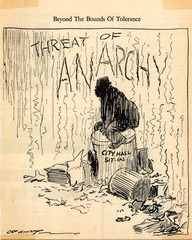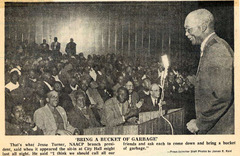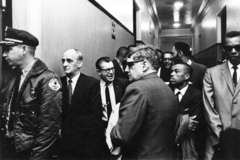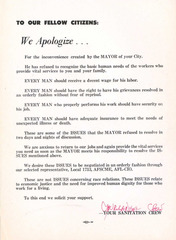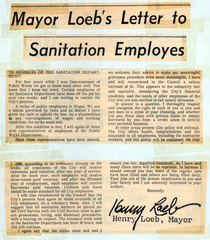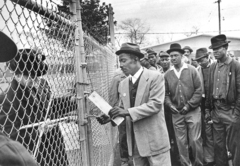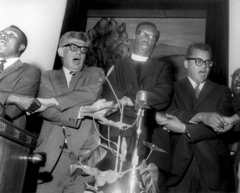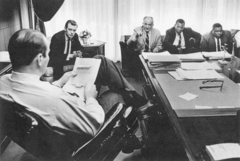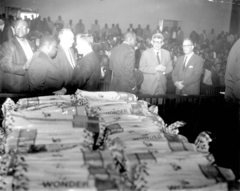- Home
- Introductory Essay
- Lives of the Sanitation Workers
- The Strike Begins
- Negotiations, Vigils, and Sandwiches
- The Macing March
- A Community Awakens
- A Nation Awakens
- Dr. King Arrives In Memphis
- Terrible Thursday
- The Men March, The Guards Watch
- I've Been To The Mountain Top
- Lorraine Motel
- Mourning
- Victory for Local 1733
- Impact on the South, 1968-1970
- Remembering Memphis
- Resources
- Credits/Contact
Negotiations, Vigils, and Sandwiches
The strike began on a bitter note. Mayor Loeb declared the strike illegal, delivered a back-to-work ultimatum and refused to negotiate. National AFSCME officials P.J. Ciampa and William Lucy arrived on February 13 to lead negotiations for Local 1733 with Mayor Henry Loeb. "I don't know of any law in Tennessee," said Ciampa, "that says you have to subject yourself to indentured servitude."
Concerned with growing racial tensions, a small group of black and white ministers urged the mayor to return to the negotiating table but was rebuffed. This group organized all night vigils at Mason Temple Church of God and picket lines in front of city hall.
AFSCME President Jerry Wurf arrived on February 18 to assist with negotiations, and by February 20, he and Ciampa submitted the union's demands which included union recognition, 10% pay increase, sick leave and dues check off, to name a few. Still Loeb refused to listen.
At a city council committee meeting for public workers, council chair Fred Davis wanted to hear "what the men themselves have to say on the issues." Seven hundred strikers quickly filled the room. Stunned, Davis ordered a recess. The workers voiced their complaints with testimonies and songs. Finally, the committee agreed to present a resolution recommending union recognition and some form of dues check off to the city council on the following day.
From the I Am A Man Exhibit Symposium
Wayne State University Walter P. Reuther Library
Reverend James Lawson discusses leaving a late night strategizing meeting with other strike leaders and fearing that a bomb might have been placed in his very recognizable car. Filmed 10/10/2003. Digitized August 2011. Clip extracted December 2011.
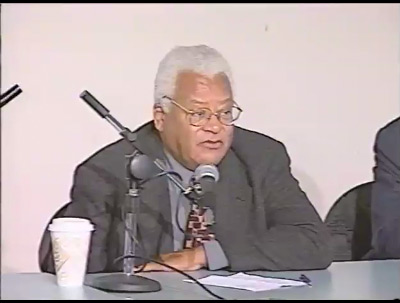
00:00 / 00:00
Jesse Turner tells crowd to bring a bucket of garbage to city hall (Creator: Reid, James R.; Date: 1968)
AFSCME International Field Staff Director P.J. Ciampa (left), AFSCME International President Jerry Wurf (middle, with back turned), and then executive assistant to Wurf, William (Bill) Lucy (far right with pipe), receive contempt of court charges on March 6, 1968, during the Memphis Local 1733 sanitation workers' strike. (Date: 1968-03-06)
Letter to citizens of Memphis apologizing for the strike and stating that the mayor should negotiate to resolve the strike
Mayor Loeb's letter in the paper to the sanitation workers telling them the strike is illegal and return to work.
Rev. Ezickel Bell, President Jerry Wurf, Rev. Harry L. Starks and Rev. James Lawson (left to right), attending a striker support rally.
Mayor Henry Loeb (far left) meeting with AFSCME Officials on February 13. Joe Paisley, Field representative, P.J. Ciampa, national director of field services, William Lucy, national associate director of legislation and T.O. Jones, president of Memphis Local 1733 February 13 (left to right). (Creator: Sellers, Barney; Date: 1968-02-28)
